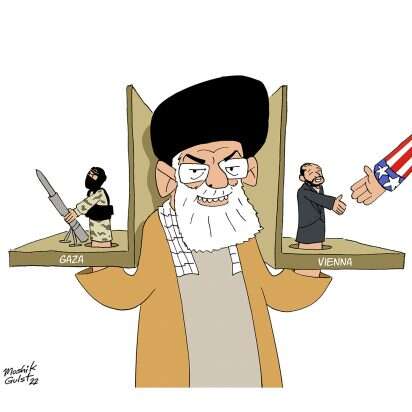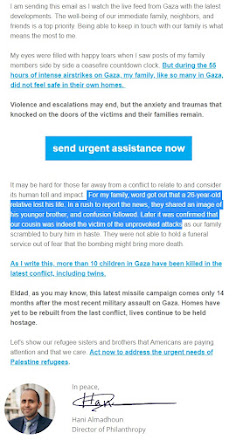David May and Richard Goldberg: With Israel under attack, Biden must fight UN anti-Semitism
Pillay’s defense of anti-Semitism is nothing new. In 2008, as the UN’s High Commissioner for Human Rights, Pillay lashed out at “certain lobby groups focused on single issues,” a coded reference to Jewish organizations, which were trying to block a follow-on to the wildly anti-Semitic (and ironically named) 2001 World Conference Against Racism in Durban, South Africa. The event led to calls to make Israel a pariah, prompted a walkout by the United States and “disintegrated into an anti-American, anti-Israeli circus,” according to Holocaust survivor Rep. Tom Lantos, who was in attendance.The European ties with terror-linked Palestinian NGOs - opinion
Pillay’s defense of her fellow commissioners’ remarks hasn’t prevented withering condemnation from the United States. Ambassadors and envoys criticized the “antisemitic, anti-Israel comments” and expressed indignation that a UN official questioned Israel’s legitimacy as a UN member. Other countries and organizations chimed in, too.
These condemnations are appropriate and welcome. But without decisive action, when the Human Rights Council convenes in September, the “Jewish lobby” commission will take Israel-bashing to a new level.
Kothari also made clear the commission is working to label Israel an apartheid state — widely expected based on its mandate to probe “systematic discrimination and repression based on national, ethnic, racial or religious identity.”
The apartheid accusation against Israel, besides being absurd, manifests an anti-Semitic goal of denying Jews the right to self-determination by claiming that Israel’s existence is a racist endeavor. In fact, that’s a textbook example of anti-Semitism put forward by the International Holocaust Remembrance Alliance, an intergovernmental group of dozens of countries committed to fighting the scourge of Jew-hatred.
In June, during the Human Rights Council’s 50th session, 21 countries joined the United States in condemning the commission’s bias against Israel. But America and its allies did not press for terminating the commission’s mandate. As events of the last days make clear, their warning shot went unheeded.
When the council reconvenes in September, the commission may try to expand its probe into Israel’s latest counterterrorism operations. Nations that stand opposed to anti-Semitism should instead join the Biden team in voting to dissolve it. This should be a high diplomatic priority for both the National Security Council and State Department — deploying National Security Adviser Jake Sullivan and Secretary of State Antony Blinken as needed to lock down the votes.
It’s also major test for the Biden administration’s belief that it could reform the Human Rights Council by rejoining it. If America proves unable to terminate the “Jewish lobby” commission’s mandate, both the administration and Congress must re-evaluate the utility of US participation in a Jew-hating circus.
SO, HOW can Europe – especially the Netherlands – pretend that there’s no reason to discontinue its support for the designated NGOs?Liz Truss: As PM, I would consider moving embassy to Jerusalem
The first clue is the sheer scope of European funding for these NGOs. In the last decade, Europe has allocated more than €200 million for the PFLP-linked NGO network. Financial support is merely one component in a much more intricate and intimate relationship that European countries maintain with these NGOs. Although European funders justify funding policies on the basis of supporting human rights, civil justice, and peace, the reality is that political goals stand at the center.
Indeed, as opposed to maintaining a disinterested relationship, these NGOs play the role of intermediaries and subcontractors, providing important services to the funders. For instance, Europe’s NGO partners are crucial sources of information and influence, particularly regarding foreign policy issues. Selected organizations can serve as influencers in public policy discourse and generate political pressure on Israel – most particularly when it comes to the future of the West Bank, Gaza and more.
Europe’s willingness to overlook, and refusal to act on, Israel’s terror-designation of six Palestinian NGOs reflects this long history and the lack of independent oversight involving millions of euros. These so-called “civil society movements” serve as a means for European officials to perpetuate one-sided policies and attempt to gain more influence regarding Israeli-Palestinian issues.
At the same time, European governments have a responsibility to examine the actual results of their continued funding for terror-linked NGOs. In the face of clear evidence of the PFLP links, the illusions of “promoting democratic values” and creating “a free and strong civil society” among Palestinians is no longer sustainable.
UK Foreign Secretary Liz Truss would consider moving her country’s embassy to Jerusalem if she becomes prime minister following next month’s Conservative Party leadership election, she wrote in a letter to Conservative Friends of Israel on Friday.
“I understand the importance and sensitivity of the location of the British Embassy in Israel,” Truss wrote. “I’ve had many conversations with my good friend Prime Minister Yair Lapid on this topic. Acknowledging that, I will review a move to ensure we are operating on the strongest footing within Israel.”
Truss also supported Israel, separately, at the launch of Operation Breaking Dawn on Friday, with the Foreign Office tweeting that she said: "The UK stands by Israel and its right to defend itself. We condemn terrorist groups firing at civilians and violence which has resulted in casualties on both sides. We call for a swift end to the violence."
In the letter to Conservative Friends of Israel, Truss wrote that she “remain[s] committed to standing up to Iranian hostility and their pursuit of nuclear weapons,”
What about Iran?
“I have been clear that progress on the Joint Comprehensive Plan of Action is not moving fast enough and I assure you that if the JCPOA collapses, all options are on the table,” Truss stated.
Israel opposes a return to the JCPOA, seeking more robust and longer-lasting limitations on Iran’s nuclear program.
In contrast to Truss, Rishi Sunak, the other Conservative candidate who was chancellor of the exchequer until recently, wrote in his letter to the pro-Israel group that he would seek “a new, strengthened nuclear deal that extends the sunset clauses, lengthens the breakout period and curtails Iran’s ballistic missile program. The credible threat of snapback sanctions, which has so far been missing from the negotiations, is the only way we can force Iran to seriously engage with these proposals.












































